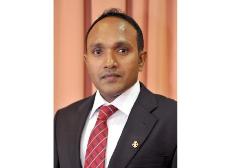An amendment seeking to inhibit parliament’s scope to change the constitutional guarantee of Islam as the Maldivian state religion has been accepted by the parliament.
The proposal was submitted by Maldivian Development Alliance (MDA) MP Ahmed Amir, who argued that the relevant clauses must be protected from the legislature.
“I find it very disturbing that the constitutional requirement of holy Islam staying as the religion of the state is subject to being changed just by the parliament if they so wish. And thereby, with the belief that changing it so that MPs alone cannot bring any changes to this article will bring peace to the minds of the parliamentarians, I have taken the initiative to propose this,” he said.
Following heated arguments for and against the amendment, parliament voted to accept the bill after 29 members in attendance voted for, 13 voted against, and 6 abstained.
The proposed amendment asks for Article 10 to be included as the first point in Article 262(b) of the Constitution of the Maldives.
Article 10 states that “(a) The religion of the State of the Maldives is Islam. Islam shall be the one of the basis of all the laws of the Maldives” and “(b) No law contrary to any tenet of Islam shall be enacted in the Maldives”.
Article 262 (b) states that the president must accept any constitutional amendments made by the Majlis after a public referendum.
“Even if one citizen does not want to allow other religions, it must remain so”: MP Amir
“The rhetoric that this bill calls for a public referendum where citizens are to be asked whether or not they want Islam to be here is, I believe, a further attempt to create resentment and dishearten people through misinformation,” he alleged.
“The best way that an amendment like this can be framed, even I believe, is to ensure that once it is reviewed in committee stage, it comes out in such a way that this article is made strong enough to not allow any changes to it at all as long as there is even one single citizen in the country who wishes it to remain the same, without allowing other religions,” he continued.
“Even we are aware that it is not necessary to include Islam in this, our constitution. Islam itself has given us a divine law to follow. As long as we are abiding by this divine law, there is in reality no need for it to be included in our man-made laws,” Amir said.
“However, because there is a fear that such an article in our constitution may be tampered with, we are obligated to protect it,” he stated.
“Instead of a referendum, mandate Supreme Court approval”: MP Muhthalib
Some of the MPs stated that while they supported the intentions behind its submission, they would choose to bring ‘minor changes’ to the proposed implementation.
Jumhooree Party (JP) MP Ibrahim Muhthalib stated that, “As things are in this world today, if even 50 people vote to say they want to adopt a religion other than Islam, foreign governments will back them up and soon start advocating for these people’s rights. They will then start harassing us. They will interfere with the internal matters of this country.”
“My suggestion is that instead of a public referendum, we change the amendment to read that such a change cannot be brought about unless it is passed by the parliament, then approved by the seven judges sitting on the Supreme Court bench, and after which it will still need to be ratified by the president,” he proposed.
“Then, god willing, there is no way that it can ever be changed. My wish is that the amendment is passed in such a way that neither Article 9 or 10 can ever be changed, even by any future parliament,” he said.
Article 9 concerns the qualifications for citizenship, which includes a clause stating that non-Muslims cannot become citizens of the Maldives.
Opposing the amendment
According to some other MPs, Article 10 of the Constitution cannot be amended or debated anywhere, including the parliament floor. Many added that they did not believe the article could be changed even after a public referendum.
Some MPs claimed that if the current parliament was to amend the article, there might be a time in the future when another composition of MPs decide to annul it altogether, insisting it was inadvisable to begin something that may lead to “serious unpredictable implications” in future.
MDP MP Ali Waheed was removed from the premises after he protested against the holding of a debate on the amendment, claiming “while there is life in this body, and I am sitting here in parliament, I will not allow such a debate to be carried out here.”
After initially taking up procedural points, he later stood in front of the speaker’s seat to express disapproval until the speaker ordered the Sergeant at Arms to remove him from the premises.
 During the same event last night, Vice President Dr Mohamed Jameel Ahmed stated that the police’s primary objective should be to ensure that they impartially enforce law, rather than whether or not they are garnering support and popularity.
During the same event last night, Vice President Dr Mohamed Jameel Ahmed stated that the police’s primary objective should be to ensure that they impartially enforce law, rather than whether or not they are garnering support and popularity.